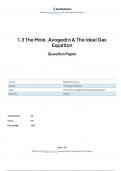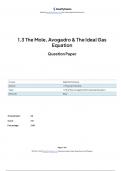Ideal gas equation - Study guides, Class notes & Summaries
Looking for the best study guides, study notes and summaries about Ideal gas equation? On this page you'll find 487 study documents about Ideal gas equation.
All 487 results
Sort by
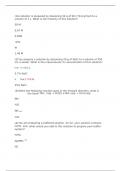 Popular
Popular
-
CHEM 120 Week 5 Exam 2 (Units 3 and 4)
- Exam (elaborations) • 14 pages • 2023
- Available in package deal
-
- $40.99
- 6x sold
- + learn more
1. A solution is prepared by dissolving 50 g of KCl (74.6 g/mol) to a volume of 1 L. What is the molarity of this solution? 2. You prepare a solution by dissolving 20 g of NaCl to a volume of 350 mL in water. What is the mass/volume % concentration of this solution? 3. When the following reaction goes in the forward direction, what is the base? 4. You are preparing a buffered solution. So far, your solution contains H2PO4- ions, what would you add to this solution to prepare your buffer sy...
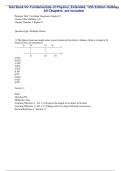 Popular
Popular
-
Test Bank for Fundamentals of Physics, Extended, 12th Edition by David Halliday
- Exam (elaborations) • 957 pages • 2024 Popular
-
- $29.49
- 3x sold
- + learn more
Test Bank for Fundamentals of Physics, Extended, 12e 12th Edition by David Halliday, Robert Resnick, Jearl Walker. Full Chapters test bank are included - Chapter 1 to 44 1 Measurement 1 1.1 Measuring Things, Including Lengths 1 1.2 Time 5 1.3 Mass 6 2 Motion Along a Straight Line 13 2.1 Position, Displacement, and Average Velocity 13 2.2 Instantaneous Velocity and Speed 18 2.3 Acceleration 20 2.4 Constant Acceleration 23 2.5 Free-Fall Acceleration 28 2.6 Graphica...
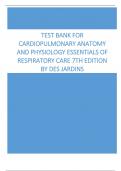
-
Test Bank for Cardiopulmonary Anatomy and Physiology Essentials of Respiratory Care 7th Edition by Des Jardins
- Exam (elaborations) • 339 pages • 2023
-
- $20.49
- 18x sold
- + learn more
Test Bank for Cardiopulmonary Anatomy and Physiology Essentials of Respiratory Care 7th Edition by Des Jardins Chapter 2 Ventilation MULTIPLE CHOICE 1. What instrument is used to measure P atm ? a. dynameter c. barometer b. altimeter d. hygrometer ANS: C Feedback A B C D A barometer is used to measure barometric (P B A barometer is used to measure barometric (P B A barometer is used to measure barometric (P B A barometer is used to measure barometric (P B ) or atmospheric (...
1.3 The Mole, Avogadro & The Ideal Gas Equation Question Paper
1.3 The Mole, Avogadro & The Ideal Gas Equation Question Paper
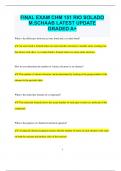
-
FINAL EXAM CHM 151 RIO SOLADO M.SCHAAB LATEST UPDATE GRADED A+
- Exam (elaborations) • 46 pages • 2024
-
- $11.99
- + learn more
FINAL EXAM CHM 151 RIO SOLADO M.SCHAAB LATEST UPDATE GRADED A+ What is the difference between an ionic bond and a covalent bond? An ionic bond is formed when one atom transfers electrons to another atom, creating ions that attract each other. A covalent bond is formed when two atoms share electrons. How do you determine the number of valence electrons in an element? The number of valence electrons can be determined by looking at the group number of the element in the periodic t...
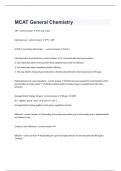
-
MCAT General Chemistry with 100% correct answers
- Exam (elaborations) • 29 pages • 2024
- Available in package deal
-
- $17.99
- + learn more
MCAT General ChemistrySTP - correct answer 0°C and 1 atm Ideal Gas Law - correct answer PV = nRT At STP, 1 mol of gas will occupy ... - correct answer 22.4 L Characteristics of an Ideal Gas - correct answer 1. Gas molecules have zero volume 2. Gas molecules exert no forces other than repulsive forces due to collisions 3. Gas molecules make completely elastic collisions 4. The avg. kinetic energy of gas molecules is directly proportional to the temperature of the gas Partial press...
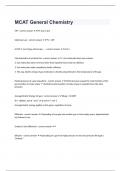
-
MCAT General Chemistry with verified answers
- Exam (elaborations) • 29 pages • 2024
- Available in package deal
-
- $17.99
- + learn more
MCAT General ChemistrySTP - correct answer 0°C and 1 atm Ideal Gas Law - correct answer PV = nRT At STP, 1 mol of gas will occupy ... - correct answer 22.4 L Characteristics of an Ideal Gas - correct answer 1. Gas molecules have zero volume 2. Gas molecules exert no forces other than repulsive forces due to collisions 3. Gas molecules make completely elastic collisions 4. The avg. kinetic energy of gas molecules is directly proportional to the temperature of the gas Partial press...
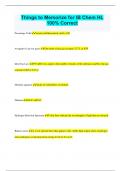
-
Things to Memorize for IB Chem HL 100% Correct
- Exam (elaborations) • 20 pages • 2024
-
Available in package deal
-
- $9.99
- + learn more
Things to Memorize for IB Chem HL 100% Correct Percentage Yeild actual yield/theoretical yield x 100 Avogadro's Law for gases One mole of any gas occupies 22.7 L at STP Ideal Gas Law PV=nRT (n is equal to the number of moles of the substance and R is the gas constant 0.082 or 8.314) Molarity equation moles of solute/liters of solution Dilution M1V1=M2V2 Hydrogen Emission Spectrum Color lines indicate the wavelengths of light that are released Balmer series A set of spec...
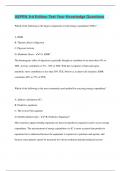
-
ASPEN 3rd Edition Test Your Knowledge Questions
- Exam (elaborations) • 82 pages • 2024
-
- $11.99
- + learn more
ASPEN 3rd Edition Test Your Knowledge Questions Which of the following is the largest component of total energy expenditure (TEE)? A. RMR B. Thermic effect of digestion C. Physical Activity D. Metabolic Stress - *A. RMR* The thermogenic effect of digestion is generally thought to contribute to no more than 10% to TEE. Activity contributes to 5% - 30% to TEE. With the exceptions of burn and sepsis, metabolic stress contributes to less than 50% TEE. However, in almost all situations, R...

$6.50 for your textbook summary multiplied by 100 fellow students... Do the math: that's a lot of money! Don't be a thief of your own wallet and start uploading yours now. Discover all about earning on Stuvia

